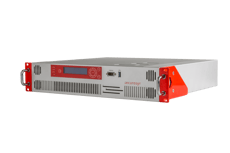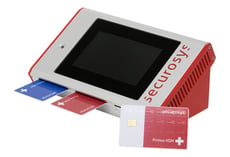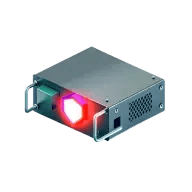Primus HSM E-Series


Challenge
Acquiring an HSM solution that maintains stringent security standards while staying within budget can be challenging. HSMs are crucial for safeguarding sensitive cryptographic keys and performing critical security functions, but they often come with a significantly high price tag. Finding the right balance between the need for robust security and cost-efficiency is key.
.webp?length=500&name=Image%20(1).webp)
Solution
Primus E-Series HSMs offer an optimal solution for moderate scale HSM requirements where cost sensitivity is paramount. Primus E-Series HSMs do not compromise in regards of performance capabilities, functionality or usability. The Primus E-Series HSM is built as network appliance level and can serve as a cost-effective alternative to traditional PCI-e card HSMs, without the need and headache of additional surrounding hardware and software operation causing additional points of failure and costs.
Primus E-Series HSMS are available in three performance classes and are capable of in-field upgrades to the next performance level without the need to acquire a higher performance level device.
.webp?length=200&name=Image%20(1).webp)
Key Benefits









Unbeatable Price/ Performance ratio
The Primus E-Series HSM delivers the functionality of full network appliances at a price comparable to PCIe card HSMs, but without their limitations or drawbacks.
In-built Security
High availability, clustering, automatic failovers, and load balancing at local or in a worldwide set-up is in-built in the HSM and does NOT require the installation of any additional software outside the HSM.
Swiss Made
Crafted entirely in Switzerland, Securosys Primus HSMs embody unmatched quality and reliability. Free from external influences, our Swiss-made HSMs guarantee the highest standards from development to production, ensuring unparalleled security solutions.
Use Cases
 Certification Authority (CA) Operations
The Primus E-Series HSM is an ideal solution for Certification Authority (CA) operations where high performance is not the primary concern, but ample storage space is crucial. With up to 6GB of storage, the E-Series HSM securely manages large volumes of cryptographic keys and certificates, ensuring the integrity and confidentiality of CA processes.
Certification Authority (CA) Operations
The Primus E-Series HSM is an ideal solution for Certification Authority (CA) operations where high performance is not the primary concern, but ample storage space is crucial. With up to 6GB of storage, the E-Series HSM securely manages large volumes of cryptographic keys and certificates, ensuring the integrity and confidentiality of CA processes.
 Public Key Infrastructure (PKI) and Key Management System (KMS) Environments
The Primus E-Series HSM provides secure key generation, storage, and management, ensuring the integrity and confidentiality of cryptographic keys essential for PKI and KMS environments.
Public Key Infrastructure (PKI) and Key Management System (KMS) Environments
The Primus E-Series HSM provides secure key generation, storage, and management, ensuring the integrity and confidentiality of cryptographic keys essential for PKI and KMS environments.
 Certificate Management
Safeguard the entire certificate lifecycle, from issuance to revocation, with the Primus E-Series HSM, ensuring trust and authenticity in digital communications.
Certificate Management
Safeguard the entire certificate lifecycle, from issuance to revocation, with the Primus E-Series HSM, ensuring trust and authenticity in digital communications.
 Protection of the Blockchain
Secure blockchain operations by leveraging the Primus E-Series HSM to protect private keys and ensure the authenticity of blockchain transactions.
Learn more
Protection of the Blockchain
Secure blockchain operations by leveraging the Primus E-Series HSM to protect private keys and ensure the authenticity of blockchain transactions.
Learn more
 Smart Metering
Enhance the security of smart metering systems by using the Primus E-Series HSM to securely store and manage cryptographic keys, ensuring the accuracy and integrity of metered data.
Learn more
Smart Metering
Enhance the security of smart metering systems by using the Primus E-Series HSM to securely store and manage cryptographic keys, ensuring the accuracy and integrity of metered data.
Learn more
 Crypto Operations (cold and hot wallets)
The Primus E-Series HSM offers secure key storage and management, critical for safeguarding crypto assets in both cold and hot wallet environments.
Learn more
Crypto Operations (cold and hot wallets)
The Primus E-Series HSM offers secure key storage and management, critical for safeguarding crypto assets in both cold and hot wallet environments.
Learn more
 Identity Access Management (IAM) and Privileged Access Management (PAM)
Ensure secure identity verification and access control by using the Primus E-Series HSM to manage cryptographic keys that protect sensitive user credentials and privileged access.
Identity Access Management (IAM) and Privileged Access Management (PAM)
Ensure secure identity verification and access control by using the Primus E-Series HSM to manage cryptographic keys that protect sensitive user credentials and privileged access.
 Cloud Access Protection (Microsoft BYOK, AWS XKS, Salesforce, CASB, etc.)
The Primus E-Series HSM enables secure cloud operations by managing keys used in Bring Your Own Key (BYOK) scenarios, external key stores, and other cloud-based encryption services.
Cloud Access Protection (Microsoft BYOK, AWS XKS, Salesforce, CASB, etc.)
The Primus E-Series HSM enables secure cloud operations by managing keys used in Bring Your Own Key (BYOK) scenarios, external key stores, and other cloud-based encryption services.
 Docker Signing, Code Signing, Document Signing
Maintain the integrity and authenticity of software and documents with the Primus E-Series HSM, which securely manages the cryptographic keys used in signing processes.
Docker Signing, Code Signing, Document Signing
Maintain the integrity and authenticity of software and documents with the Primus E-Series HSM, which securely manages the cryptographic keys used in signing processes.
 eIDAS, ZertES, or QSCD Operations
Comply with European and Swiss digital signature regulations by using the Primus E-Series HSM to securely manage Qualified Signature Creation Devices (QSCD) for eIDAS and ZertES operations.
eIDAS, ZertES, or QSCD Operations
Comply with European and Swiss digital signature regulations by using the Primus E-Series HSM to securely manage Qualified Signature Creation Devices (QSCD) for eIDAS and ZertES operations.
 Database Security
Protect sensitive data within databases by using the Primus E-Series HSM to manage encryption keys, ensuring data remains secure both at rest and in transit.
Database Security
Protect sensitive data within databases by using the Primus E-Series HSM to manage encryption keys, ensuring data remains secure both at rest and in transit.
Technical Specifications
- Multilevel security architecture
- Internal hardware supervision for error-free operations
Authentication (extract)
- 128/192/256-Bit AES
with GCM-, CTR-, ECB-, CBC-, MAC-mode - Camellia, 3DES (legacy), ChaCha20-Poly1305, ECIES
- RSA 1024-8192, DSA 1024-8192
- ECDSA 224-521, GF(P) arbitrary curves (NIST, Brainpool,...)
- ED25519, Curve25519, Ed448, BIP-0340, BIP-0341, SLIP-10
- Diffie-Hellman 1024-4096, ECDH, X448
- SHA-2/SHA-3 (224-512), SHA-1, RIPEMD-160, SHAKE
- HMAC, CMAC, GMAC, Poly1305
- Post-Quantum Cryptographic (PQC) algorithms (optional)
ML-DSA, SLH-DSA, ML-KEM, HSS-LMS, XMSS
- Two hardware true random number generators (TNRG)
- NIST SP800-90 compatible random number generator
- Key capacity: up to 6 GB
- E150 up to 50 partitions @ 120 MB capacity
- E60/E20 up to 10 partitions @ 120 MB capacity
- Number of client connections not restricted
- Unlimited number of backups, automated backup
- Several sensors to detect unauthorized access
- Active destruction of key material and sensitive data on tamper
- Transport and multi-year storage tamper protection by digital seal
- Cryptographic evidence of audit relevant parameters (keys, configuration, hardware, states, logs, time-stamping)
- Multiple security officers (m out of n)
- Identification based on smart card and PIN using Decanus Terminal, or through virtual smart card
- JCE/JCA provider
- PKCS#11 provider and OpenSSLv3 provider
- Microsoft CNG/KSP
- REST (TSB module)
- IPv4/IPv6
- Interface bonding (LACP or active/backup)
- Monitoring and log streaming (SNMPv3, syslog/TLS)
- Active clustering of multiple units for load-balancing and fail-over
- Local configuration (GUI, console)
- Remote administration (Decanus Terminal and SSH)
- Local and remote firmware update
- Network attached storage data transfer (WebDAV option)
- Secure log and audit
- Enhanced diagnostic functions
(transactions per second)
| Model | RSA 4096 |
ECC 256 |
ECC 521 |
AES 256 |
| E150 | 200 | 1500 | 300 | 600 |
| E60 | 60 | 700 | 120 | 600 |
| E20 | 20 | 350 | 60 | 200 |
- Power supply: 100 ... 240 V AC, 50 ... 60 Hz
E150 with two redundant hot pluggable power supplies - Power dissipation: 30 W (typ), 50 W (max)
- Backup lithium battery: Lithium Thionyl Chloride 0.65g Li, IEC 60086-4, UL 1642, 3.6V
- 4 Ethernet RJ-45-ports with 1 Gbit/s (rear)
- 1 RS-232 management port (rear)
- 1 USB management port (rear)
- Console interface (local, SSH)
- 4 LEDs for system and interface status (multicolor)
- Optional Decanus Terminal for remote administration
- EMV/EMC: EN 55022, EN 55024, FCC Part 15 Class B
- Safety: IEC 62368-1
- Temperature ranges (IEC 60068-2-1 Ad, IEC 60068-2-2 Bd): storage -25 ... +70 °C; operation 0 ... +40 °C,
recommended +1 ... +30 ̊C - Humidity (IEC 60068-2-78 Cab): 40 °C, 93% RH, non-condensing
- MTBF at tamb=25 °C: 80 000 h
- Dimensions (w×h×d) 417 x 44 x 365 mm (1U 19" EIA standard rack)
- Weight 5,8 kg
- FIPS140-3 Level 3 (in progress)
- CC EN 419221-5 eIDAS protection profile
- CE, FCC, UL
Related Products
 Primus HSM Cyber Vault (X2 Models)
The Hardware Security Modules that combine performance and cyber security innovation
Primus HSM Cyber Vault (X2 Models)
The Hardware Security Modules that combine performance and cyber security innovation
 Primus HSM CyberVault Core
Next-Generation Cryptographic Protection at an Unmatched Performance/Price Ratio
Primus HSM CyberVault Core
Next-Generation Cryptographic Protection at an Unmatched Performance/Price Ratio
 Primus HSM X-Series
Ideal hardware for advanced encryption standards and digital signatures
Primus HSM X-Series
Ideal hardware for advanced encryption standards and digital signatures
 Decanus Terminal
Remote management device for your HSM and user partitions
Decanus Terminal
Remote management device for your HSM and user partitions










